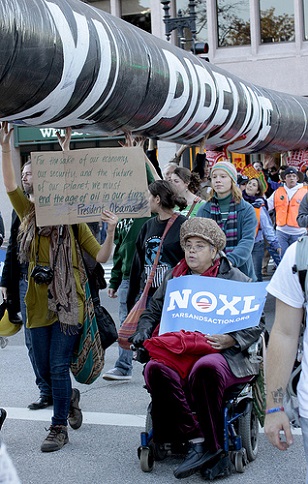 tarsandsaction / Flickr)” width=”308″ height=”484″ />Keystone XL Pipeline Protest at the White House, November 6, 2011. (Photo: tarsandsaction / Flickr)Let’s get real for a second.
tarsandsaction / Flickr)” width=”308″ height=”484″ />Keystone XL Pipeline Protest at the White House, November 6, 2011. (Photo: tarsandsaction / Flickr)Let’s get real for a second.
I’m so sick of politicians, industry lackeys and uninformed citizens who tell me that opposing the Keystone XL is tantamount to sabotaging the American economy.
These pro-fossil-fuel parrots go on and on about how they would drill for oil in their own front yards it if meant cheaper gas at the pump. These people act as though cheap gas were some sort of unalienable right or the sole factor in determining America’s success or failure.
They speak about the Keystone XL as if it were an economical silver bullet — just start extracting and transporting Canada’s tar sands oil, and voila: we’ll all suddenly have good jobs and fat bank accounts. Nauseating. And, according to yet another report, a bald-faced lie.
Consumer Watchdog recently released a new report, titled Keystone XL: Oil Industry Cash Machine. The producers of the report — Research Director Emeritus Judy Dugan and independent energy analyst Tim Hamilton — utilized industry data, public records and company documents to debunk the blind passion for oil that passes for patriotism these days.
One of the report’s most interesting revelations is that the Keystone XL pipeline will likely raise gasoline prices in the United States, not lower them.
“Keystone XL is not an economic benefit to Americans who will see higher gas prices and bear all the risks of the pipeline,” said report author Judy Dugan in a press release. “The pipeline is being built through America, but not for Americans.”
The report reinforces what us “crazy environmentalists” have been trying to point out for years: The chief purpose of the pipeline is to help Canada increase it’s own revenue by opening up new, overseas markets for tar sands oil. Not to decrease American gas price.
Right now, a good portion of Canada’s filthy crude ends up in the Midwestern United States. With the construction of the Keystone XL, they would no longer have to settle for American prices. The oil would flow uninterrupted to Gulf Coast refineries (owned by the same companies currently investing in the tar sands and pushing for its approval) where it could be loaded up quickly and shipped to Europe and other countries willing to pay a premium for diesel.
“Midwest drivers would be hardest hit because the region currently imports more than half of its oil for refining from Canada,” explains the report. “Increases at the pump could range from 25 cents to 40 cents a gallon, depending on how regional refineries respond to paying $20 to $30 more per 42-gallon barrel for Canadian crude oil.”
Keystone XL supporters, like the author of this Wall Street Journal article, claim that by rejecting the pipeline, Americans would basically concede our economic viability to China and regress into a pre-industrial land of horse and buggies. What they fail to mention, however, is that “two major Chinese petrochemical companies…have an interest in exporting crude oil and/or refined products to their markets. Such exports would drain off what the tar sands producers consider a current oversupply, and help push global oil prices higher.”
The conclusion of the report is: “U.S. consumers should be wary of the Keystone XL pipeline — not just for substantial environmental and safety reasons, but because it threatens their wallets. Given the fleeting benefits of construction jobs, the unprovability of long-term benefits and the negative effect of higher gasoline costs on consumers, Keystone XL is no economic boon to the United States. U.S. consumers and the overall economy would bear the substantial risks of the pipeline without measurable permanent benefit.”
It’s got a lot of economic jargon, but I encourage you to read the report [PDF] for yourself, or at least the executive summary. It’s not as anti-establishment as you might think. Rather, it exposes the misinformation campaign that has surrounded the Keystone XL for nearly a decade.
And once you’ve read it, forward it to a friend or two. Let’s show these oil companies we’re not the chumps they think we are.
Join us in defending the truth before it’s too late
The future of independent journalism is uncertain, and the consequences of losing it are too grave to ignore. To ensure Truthout remains safe, strong, and free, we need to raise $46,000 in the next 7 days. Every dollar raised goes directly toward the costs of producing news you can trust.
Please give what you can — because by supporting us with a tax-deductible donation, you’re not just preserving a source of news, you’re helping to safeguard what’s left of our democracy.
